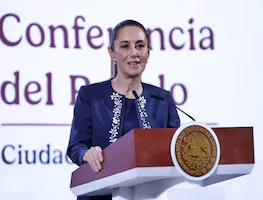Más Información

“En algunos años habrá una secretaria de la Defensa”, afirma subdirectora de la Escuela Militar de Medicina

Claudia Sheinbaum, por definir asistencia presencial a reunión "urgente" de la Celac; migración, tema clave del encuentro

Noroña califica política de EU como hipócrita, racista y fascista; se solidariza con Petro ante deportaciones

Magistrada Mónica Soto propone sustituir al Comité de Evaluación del PJ; plantea someter a insaculación a aspirantes elegibles

Magistrado Reyes Rodríguez propone validar registros de aspirantes con promedio inferior a 8; excluirlos es “estigmatizante”, señala
Undoubtedly, climate change is a reality. We know the causes – our Earth's own nature, combined with the exploitation of natural resources, and the industrial activities until now – yet what is still an unfamiliar universe we're just beginning to catch a glimpse of, with disheartening possibilities predicted decades ago by scientists, is the impact of climate change on our planet as a whole; our oceans, wind currents, global temperature, ice melting, among others. And we still ignore the consequences this change could have on human civilization if we continue on this path.
Furthermore, this is a problem which concerns all of us, because, on the face of natural catastrophes, borders, religion or power will matter little. The devastating effects will strike the rich and the poor alike, from the North or from the South.
Climate change is not only an environmental issue; it's also a matter of economics, human health, and food supply. According to experts, it's clear our world is changing and this is happening at a faster pace than what was predicted.
Even though there still isn't consensus regarding the direct impact of climate change on magnitude and amount of meteorological phenomena, such as hurricanes – the U.S. weather service stated in its latest report that it was still premature to establish a pattern – scientists consistently acquire more data on their correlation, concretely, on the increase of magnitude, devastation, and consequences of cyclones.
As recent examples, we have tropical storms Harvey, Irma, and José. For the socialist group leader of the European Parliament, Gianni Pittella, common sense is enough to establish the relationship between climate change and these recent meteorological phenomena.
Events such as Harvey must be interpreted as a warning sign for Governments: it's urgent to accelerate actions to reduce heat-trapping emissions and to better prepare communities for increasingly intense weather conditions. Starting from now we need to improve urban development, avoid building in risk areas and use cutting-edge technologies to assist us in this task.
Despite the withdrawal of the United States from the Paris Agreement – which Donald Trump encouraged in his country's best interests – nations worldwide should establish the ambitious goals of this agreement as a priority and prevent Earth's temperature from heating 2 degrees. Crossing that red line will be our point of no return.





